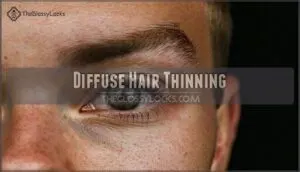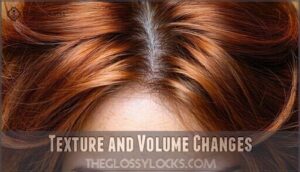This site is supported by our readers. We may earn a commission, at no cost to you, if you purchase through links.
 Hair loss treatment for thyroid patients requires addressing both hormonal imbalance and targeted hair care strategies.
Hair loss treatment for thyroid patients requires addressing both hormonal imbalance and targeted hair care strategies.
Start by working with your doctor to optimize thyroid hormone levels through medication—this forms the foundation of recovery.
Support treatment with iodine-rich foods like seafood and eggs, protein sources for hair strength, and omega-3 fatty acids to reduce scalp inflammation.
About 60% of thyroid patients experience telogen effluvium, where hair follicles enter a resting phase prematurely.
The good news? Hair typically regrows once hormone levels stabilize, though it takes 2-3 months to see initial improvements.
Advanced therapies like low-level light therapy and microneedling can accelerate results when dietary changes alone aren’t enough.
Table Of Contents
- Key Takeaways
- Thyroid-Hair Loss Connection: Unraveling The Science
- Identifying Thyroid-Induced Hair Loss Symptoms
- Dietary Strategies to Combat Thyroid Hair Loss
- Lifestyle Changes to Promote Hair Regrowth
- Advanced Therapies for Stubborn Hair Loss
- Managing Expectations: Timeline for Hair Regrowth
- Psychological Support for Hair Loss Patients
- Frequently Asked Questions (FAQs)
- What to do about thyroid hair loss?
- How long does it take to reverse thyroid hair loss?
- How do you treat thyroid-related hair loss?
- Can hypothyroidism cause thinning hair?
- Can a thyroid supplement help with hair loss?
- Can thyroid hair loss be reversed?
- How to stop hair loss from thyroid disease?
- Can hair loss due to thyroid be reversed?
- What vitamins are good for hypothyroid hair loss?
- How do you fix Hashimoto’s hair loss?
- Conclusion
Key Takeaways
- Work with your doctor to optimize thyroid hormone levels first – this is the foundation that makes everything else work, since balanced hormones are essential for hair follicles to exit their resting phase and start growing again.
- Focus on nutrient-dense foods that support both thyroid function and hair growth – you’ll want iodine-rich seafood and eggs, protein sources for hair strength, and omega-3 fatty acids to reduce scalp inflammation.
- Be patient with the timeline but stay consistent – you’ll typically see reduced shedding within 2-3 months and visible regrowth starting around 6-8 months, so don’t give up if results seem slow.
- Consider advanced therapies if diet and medication aren’t enough – options like low-level light therapy, PRP injections, or microneedling can accelerate results when standard treatments plateau.
Thyroid-Hair Loss Connection: Unraveling The Science
Your thyroid doesn’t just control your metabolism—it directly impacts every hair follicle on your head, determining whether your hair grows thick and healthy or falls out in concerning amounts.
When thyroid hormones like T3 and T4 become imbalanced, they disrupt the natural hair growth cycle, often pushing follicles into a prolonged resting phase that leads to widespread thinning and increased shedding.
Hormonal Imbalance and Hair Growth Cycle
Your thyroid gland orchestrates a complex dance between hormone regulation and hair follicle activity, directly influencing your hair growth cycle.
When thyroid hormone levels fall out of balance, this disrupts the natural growth phases that keep your hair healthy and full.
Here’s how hormonal imbalance affects your regrowth patterns:
- Anagen disruption – Low thyroid hormones shorten the active growth phase, causing premature shedding
- Telogen prolongation – Hair follicles stay dormant longer, reducing new hair production
- Keratinocyte dysfunction – Poor hormone regulation weakens hair structure and quality
Understanding thyroid balance becomes essential for effective hair loss treatment, as thyroid and hair changes often mirror each other’s severity.
Types of Thyroid Disorders Affecting Hair
Understanding how hormonal imbalances disrupt your hair’s growth cycle sets the stage for exploring which specific thyroid conditions cause the most damage to your locks.
Hypothyroidism and hyperthyroidism represent opposite ends of thyroid dysfunction, yet both wreak havoc on your hair.
Hashimoto’s thyroiditis leads to hypothyroidism hair loss, while Graves’ disease triggers hyperthyroidism hair loss.
Here’s how these conditions stack up:
| Condition | Thyroid Function | Hair Loss Pattern |
|---|---|---|
| Hashimoto’s | Underactive (Hypothyroidism) | Slow, diffuse thinning |
| Graves’ Disease | Overactive (Hyperthyroidism) | Rapid, patchy shedding |
| Thyroiditis | Variable | Temporary hair loss |
Goiter can accompany either condition, adding another layer of complexity to thyroid hair loss.
Whether you’re dealing with hair loss Hashimotos or thyroiditis-related shedding, recognizing your specific condition helps target the right treatment approach for regaining your hair’s health.
Telogen Effluvium in Thyroid Patients
About 60% of thyroid patients experience telogen effluvium, a thyroid-related shedding when hormone balance goes haywire. This condition pushes hair follicles into an extended telogen phase, causing thyroid hair loss that affects overall follicle health.
Here’s what happens during telogen effluvium:
- Hair follicles prematurely enter the resting phase due to disrupted thyroid hormones
- Increased thyroid shedding occurs 2-3 months after the initial hormone imbalance
- Hair regrowth stalls until proper treatment restores normal hormone levels
Understanding the stress reduction techniques is essential for managing telogen effluvium.
Don’t worry—treating your underlying thyroid condition typically reverses this process within 6-8 months.
Identifying Thyroid-Induced Hair Loss Symptoms
You’re probably losing more hair than your shower drain can handle, and that texture might feel like you’re styling straw instead of silk.
Recognizing these telltale signs of thyroid-related hair loss can help you connect the dots between your sluggish thyroid and your thinning locks.
Diffuse Hair Thinning
When you notice your hair texture becoming thinner across your entire scalp, you’re experiencing diffuse hair thinning—a telltale sign of thyroid related hair loss.
This uniform reduction in hair density affects scalp health and follicle care, creating noticeable volume loss without distinct bald patches.
Thinning causes from thyroid dysfunction disrupt normal regrowth patterns, making thyroid hair loss appear gradual yet widespread.
Unlike other hair thinning types, thyroid hair regrowth remains possible with proper treatment.
Recognizing early signs of hair is essential for addressing thyroid-induced hair loss effectively.
Excessive Hair Shedding
Beyond thinning, you’ll likely encounter excessive hair shedding when thyroid hormones fall out of balance.
This condition, called telogen effluvium, pushes hair follicles into a resting phase prematurely.
You might find clumps of hair on your pillow, in the shower drain, or tangled in your brush.
Thyroid hair loss typically means losing over 100 strands daily, compared to the normal 50-100.
The good news? Most thyroid medication hair loss reverses once hormone levels stabilize, allowing follicle repair and healthy hair regrowth to resume naturally.
Texture and Volume Changes
When thyroid dysfunction strikes your hair follicles, you’ll notice dramatic changes beyond simple shedding.
Hair texture becomes increasingly coarse and dry, while hair volume plummets as follicle damage disrupts normal regrowth patterns.
Your once-lustrous locks may feel brittle, breaking easily during styling, and hair density decreases noticeably, leaving your scalp health compromised.
This creates uneven regrowth patterns that make styling challenging, affecting the overall health and appearance of your hair, particularly in terms of normal regrowth.
Dietary Strategies to Combat Thyroid Hair Loss
Your diet plays a vital role in supporting both thyroid function and healthy hair regrowth, making strategic food choices your first line of defense against thyroid-related hair loss.
The right nutrients can help restore hormonal balance while providing your hair follicles with the building blocks they need to produce strong, healthy strands, which is crucial for thyroid function.
Iodine-Rich Foods for Thyroid Function
Your thyroid craves iodine like a car needs fuel. Seafood benefits shine through kelp, nori, and cod, delivering powerful dietary iodine for ideal thyroid function.
Dairy products, eggs, and iodized salt round out your iodine sources arsenal. These thyroid nutrition staples support hormone production, but balance matters—too much can backfire.
Food supplements aren’t always necessary when you’re eating smart. Your thyroid health depends on consistent, moderate intake rather than sporadic overdoses.
A balanced diet that includes foods for scalp health can also contribute to overall well-being.
Protein-Rich Diet for Hair Strength
Beyond mere dietary choices, your hair’s strength depends on amino acids from quality protein sources.
Thyroid hair loss requires strategic nutrient balance through lean meats, eggs, fish, and legumes. These foods deliver essential building blocks for hair protein synthesis, supporting hair growth and hair fortification.
While biotin and dietary supplements help, whole foods remain your thyroid diet’s foundation for stronger strands. Incorporating protein rich foods into your diet can substantially enhance hair strength and overall health.
Omega-3 Fatty Acids for Scalp Health
Beyond protein, your scalp craves omega-3 fatty acids for ideal thyroid hair loss recovery. These Fatty Acid Benefits include reducing Scalp Inflammation and promoting a Healthy Scalp environment that supports hair growth.
Research shows Fish Oil Effects can improve hair density when thyroid and scalp health are compromised.
Boost your omega-3 intake with these sources:
- Salmon, mackerel, and sardines twice weekly
- Ground flaxseeds sprinkled on breakfast foods
- Omega 3 Supplements after consulting your healthcare provider
These nutrients help create the foundation for stronger hair follicles during thyroid treatment. Incorporating omega 3 supplements can be beneficial for overall scalp health.
Iron-Rich Foods to Prevent Deficiency
Iron deficiency frequently undermines hair growth in thyroid patients, creating a double burden for your already struggling follicles.
Combat this by loading up on iron rich foods like red meat, spinach benefits include high iron content, and beans packed with bean nutrition.
Pair these with vitamin C sources like citrus fruits to boost absorption dramatically.
Iron supplements might be necessary if ferritin levels drop below desirable ranges.
Regular blood tests help monitor iron levels and prevent iron deficiency from worsening thyroid hair loss.
Lifestyle Changes to Promote Hair Regrowth
Simple lifestyle changes can substantially accelerate hair regrowth while your thyroid treatment works its magic.
You’ll discover that managing stress, adopting gentle hair care routines, staying active, and prioritizing quality sleep creates the perfect environment for your hair follicles to bounce back stronger than before, with complete concepts in harmony.
Stress Management Techniques
Beyond nutrition, stress management becomes your secret weapon against thyroid-related hair loss.
Chronic stress elevates cortisol levels, which can worsen thyroid dysfunction and accelerate hair shedding.
Here are five proven relaxation techniques to help you regain control:
- Mindfulness Meditation – Practice 10 minutes daily to lower cortisol
- Deep Breathing exercises using the 4-7-8 technique
- Yoga Exercises targeting gentle poses like child’s pose
- Aromatherapy Therapy with lavender or chamomile oils
- Progressive muscle relaxation before bedtime
These approaches directly combat the thyroid and stress connection that fuels hair loss.
Gentle Hair Care Practices
Three simple steps can transform your hair routine, starting with Hair Washing every 2-3 days using sulfate-free shampoo. Begin each session with Scalp Massage using fingertips, not nails, to boost circulation without irritation. Practice Gentle Combing with a widetoothed comb on damp hair, working from tips upward.
| Practice | Frequency | Benefit |
|---|---|---|
| Hair Oiling with coconut/argan oil | 2x weekly | Nourishes follicles, reduces breakage |
| Soft Styling (air-dry, low heat) | Daily | Prevents thermal damage |
| Gentle hair care routine consistency | Ongoing | Supports thyroid hair supplements effectiveness |
Your hair routine matters more than expensive hair vitamins thyroid patients often chase—consistency beats costly quick fixes every time.
Regular Exercise for Hormonal Balance
While gentle hair care protects what you have, regular exercise becomes your hormonal reset button.
Exercise routines targeting hormone regulation work wonders for thyroid hormone imbalance.
Yoga benefits include lowered cortisol and improved hormone production, while structured fitness plans offer stress reduction.
Even moderate workouts help rebalance thyroid and hormonal imbalances, creating the perfect environment for hair regrowth.
Your body craves movement to combat hormonal hair loss naturally.
Adequate Sleep for Hair Health
Your Sleep Patterns directly impact Hair Regrowth through hormonal regulation.
Aim for seven to nine hours of quality rest nightly to support Hair Restoration.
During deep sleep, your body produces growth hormones that fuel follicle activity, while poor Sleep Quality elevates cortisol levels that accelerate Thyroid Hair Loss.
Consistent Rest Duration optimizes your body’s natural Hair Loss Treatment for Thyroid Patients by balancing the hormones essential for healthy Hair Regrowth.
Advanced Therapies for Stubborn Hair Loss
When standard treatments aren’t delivering the hair regrowth you’re hoping for, it’s time to explore advanced therapeutic options that target your follicles more directly.
These cutting-edge treatments work by stimulating blood flow, delivering growth factors, or mechanically encouraging your scalp to produce healthier, stronger hair, which can be achieved through cutting-edge treatments.
Low-Level Light Therapy (LLLT)
While lifestyle changes form your foundation, Low-Level Light Therapy offers targeted hair stimulation for thyroid patients.
This photobiomodulation treatment uses red light wavelengths to energize dormant follicles, showing promising results in clinical studies.
Here’s how LLLT works for you:
- Light Treatment Process: Red light penetrates your scalp, boosting cellular energy production
- Hair Stimulation Timeline: Expect visible changes after 16-24 weeks of consistent use
- Laser Therapy Options: Choose from handheld devices, caps, or professional treatments
- Safety Profile: Minimal side effects with no medication interactions
- Compatibility: Works alongside standard thyroid hair loss treatments
This FDA-cleared approach offers hope when traditional methods aren’t enough. The treatment utilizes a low level laser to promote hair growth.
Platelet-Rich Plasma (PRP) Injections
Platelet-rich plasma (PRP) therapy transforms your blood into a powerful hair regrowth catalyst. This treatment outcomes-focused approach concentrates platelets from your blood, then injects them into thinning areas for scalp stimulation.
PRP therapy delivers impressive results for thyroid hair loss:
- 22% improvement in hair density for stubborn cases
- Growth factors awaken dormant follicles naturally
- Three sessions spaced monthly typically required
- Minimal downtime with your body’s own healing power
These plasma injections work by targeting follicular miniaturization—exactly what happens during thyroid-related hair loss treatments. Patients can expect significant improvements in their hair density through hair growth treatments.
Microneedling for Scalp Stimulation
Microneedling Therapy works by creating controlled micro-injuries that trigger your scalp’s healing response.
While PRP uses your blood’s growth factors, microneedling harnesses your body’s natural repair mechanisms for hair regeneration.
This scalp stimulation technique uses tiny needles to puncture the skin, promoting collagen boost and skin renewal.
For thyroid related hair loss, this process can wake up dormant follicles and improve blood flow to affected areas.
| Treatment Aspect | Microneedling Details | Key Benefits |
|---|---|---|
| Needle Depth | 0.5-1.5mm for scalp | Stimulates without damage |
| Session Frequency | Every 4-6 weeks | Allows proper healing time |
| Pain Level | Mild discomfort | Most patients tolerate well |
| Results Timeline | 3-6 months visible | Gradual hair regrowth |
| Combination Therapy | Works with topicals | Enhanced absorption |
Microneedling specifically helps thyroid hair loss by improving circulation and nutrient delivery to struggling follicles.
The controlled trauma triggers growth factors that support hair regeneration, making it particularly effective for scalp hair loss patterns common in thyroid patients.
Hair Transplantation Options
For severe thyroid hair loss, hair transplantation offers permanent restoration through Follicular Transfer techniques.
FUE (Follicular Unit Extraction) harvests individual grafts from healthy Donor Sites, while FUT (Follicular Unit Transplantation) removes scalp strips for Hair Grafting.
This Scalp Reconstruction through Transplant Surgery provides lasting hair regrowth when thyroid treatments plateau, giving your confidence a genuine boost.
Managing Expectations: Timeline for Hair Regrowth
Understanding your hair regrowth timeline helps set realistic expectations and prevents frustration during treatment.
You’ll typically see initial improvements within 6-8 months of achieving ideal thyroid hormone levels, though complete recovery can take up to 18 months depending on your specific condition and treatment response.
Short-Term Vs. Long-Term Results
Treatment outcomes for thyroid hair loss vary substantially between short and long-term periods.
You’ll likely notice reduced shedding within 2-3 months of starting thyroid hair loss treatment, but don’t expect visible regrowth timeline improvements until 6-8 months.
Hair density recovery happens gradually—think marathon, not sprint.
Recovery speed depends on your body’s response to medication and overall health status.
Result variability means some people see changes faster than others when managing thyroid hair loss.
Remember, treating thyroid hair loss requires patience since hair grows only half an inch monthly, making thyroid hair loss solutions a long-term commitment for ideal hair loss management.
Factors Affecting Hair Regrowth Speed
Understanding your hair regrowth timeline helps set realistic expectations for your thyroid recovery journey.
Several factors influence how quickly your hair follicle responds to thyroid hormone regulation. Your age plays a significant role – younger patients under 40 typically see faster results than older individuals.
Hormone balance restoration through consistent thyroid medication affects regrowth rate, with TSH levels below 2.5 mIU/L showing better outcomes. Nutrient uptake also matters, as iron and vitamin deficiencies can slow progress even with proper thyroid hair loss management.
Consider these key factors:
- Your genetics determine baseline hair growth patterns
- Medication adherence directly impacts thyroid hormone regulation success
- Coexisting conditions like anemia can hinder hair regrowth
- Duration of untreated thyroid dysfunction affects recovery speed
Understanding the role of hormone balance is essential for effective hair regrowth.
Remember, thyroid medication side effects may initially worsen shedding before improvement begins.
Monitoring Progress and Adjusting Treatment
Success tracking your thyroid hair loss progress requires regular lab work and keen observation.
Monitor TSH, iron, and ferritin levels every three months to guide medication adjustments.
Document hair regrowth patterns through photos and notes about thickness changes.
Your doctor will modify thyroid hormone regulation based on treatment outcomes and progress tracking data.
Expect follow-up schedules every 6-8 weeks initially.
Hair loss treatment success unfolds slowly, requiring patience as thyroid hormone management stabilizes your system.
Psychological Support for Hair Loss Patients
Hair loss from thyroid issues affects more than just your appearance—it can shake your confidence and emotional well-being.
You’ll need both practical solutions like wigs or extensions and professional support to navigate the psychological challenges while your hair regrows.
Professional Counseling Options
While you wait for hair regrowth from your thyroid treatment, professional counseling offers real relief from emotional stress.
Think of it as essential support for your mental health journey.
Here are five counseling techniques that help thyroid and hair loss patients:
- Cognitive-behavioral therapy (CBT) – reduces anxiety and negative thought patterns
- Support groups – connect with others facing similar hair loss in women experiences
- Psychodynamic therapy – addresses deeper emotional responses to appearance changes
- Online therapy platforms – provides accessible emotional support options
- Multidisciplinary clinics – offers integrated medical and psychological care.
Research shows 67% of patients report improved coping strategies after six months of therapist guidance.
You’re not alone in this struggle, and seeking help strengthens your resilience while managing thyroid-related challenges.
Temporary Hair Solutions (Wigs, Extensions)
While counseling helps address emotional aspects, Hair Pieces and extensions offer immediate confidence boosts during thyroid hair loss recovery.
Wig Styles range from synthetic to human hair options, while Extension Types include Clip Ins and Hair Toppers for targeted coverage.
These hair loss solutions for women provide instant volume and length. Proper maintenance keeps your temporary hair management looking natural.
Choose breathable materials and consult stylists for the best hair treatment match.
Frequently Asked Questions (FAQs)
What to do about thyroid hair loss?
Like telegraph operators once frantically tapped out urgent messages, you’ll need swift action to restore your crowning glory.
First, get proper thyroid treatment with levothyroxine or antithyroid medications.
Add nutritional support through iron, biotin, and protein.
Hair typically regrows within six to eight months of treatment.
How long does it take to reverse thyroid hair loss?
You’ll typically see hair regrowth starting 6-8 months after proper thyroid treatment begins, though complete recovery may take longer and isn’t always guaranteed for everyone.
How do you treat thyroid-related hair loss?
Up to 60% of hypothyroid patients experience diffuse hair thinning, but you can reverse it by treating your thyroid disorder first, then addressing nutritional deficiencies and considering topical treatments like minoxidil.
Can hypothyroidism cause thinning hair?
Yes, hypothyroidism can definitely cause thinning hair.
When your thyroid doesn’t produce enough hormones, it disrupts your hair’s growth cycle, leading to diffuse thinning and increased shedding across your entire scalp.
Can a thyroid supplement help with hair loss?
Think of your thyroid as a master conductor directing your hair’s orchestra.
Yes, thyroid supplements can restore hair growth by correcting hormone imbalances that disrupt follicle function, though regrowth typically takes six to eight months.
Can thyroid hair loss be reversed?
Hair loss from thyroid dysfunction can often be reversed with proper treatment.
When you restore normal hormone levels through medication, hair regrowth typically begins within six to eight months of starting therapy.
How to stop hair loss from thyroid disease?
Up to 60% of thyroid patients experience diffuse hair thinning.
But you can stop it by treating your underlying thyroid condition with proper medication, addressing nutritional deficiencies, and maintaining balanced hormone levels.
Can hair loss due to thyroid be reversed?
Absolutely, you can reverse thyroid-related hair loss. When you treat your thyroid condition properly, hair typically regrows within six to eight months, though complete restoration varies by individual circumstances.
What vitamins are good for hypothyroid hair loss?
Biotin, B-complex vitamins, vitamin D, iron, zinc, and selenium support healthy hair growth.
You’ll also benefit from vitamins A, C, and E, which nourish follicles and improve circulation to your scalp, and these elements together provide a comprehensive approach to healthy hair growth.
How do you fix Hashimoto’s hair loss?
Surprisingly, many don’t realize that treating the underlying autoimmune condition comes first.
You’ll need thyroid hormone replacement therapy, plus addressing nutritional deficiencies like iron, biotin, and zinc to restore healthy hair growth.
Conclusion
Like a garden returning to bloom after winter, your hair can recover with the right approach.
Hair loss treatment for thyroid patients centers on hormone optimization through medical care, combined with targeted nutrition and gentle scalp therapies.
You’ll need patience, as results typically appear within 2-3 months of stabilized thyroid levels.
Remember, combining iodine-rich foods, protein sources, and omega-3 fatty acids with advanced treatments like light therapy creates the most effective strategy.
Your hair’s recovery journey requires consistency, but restoration is absolutely achievable.














